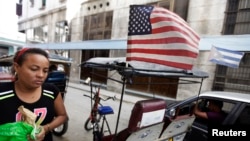The U.S. Treasury says new rules relaxing restrictions on trade and travel with Cuba will be implemented beginning Friday.
The move is a step toward the Obama administration's goal, announced last month, of normalizing ties with the communist nation.
In a statement Thursday, Treasury Secretary Jack Lew said the United States was "one step closer to replacing out-of-date policies that were not working."
Under the new rules, Americans will not need to apply for a license to be able to travel to Cuba for any of a dozen approved reasons, including family visits, education, and humanitarian and religious work. Travel agents and airlines will be allowed to provide authorized services without a license. But general tourism to Cuba remains banned.
Robert Muse, a Washington attorney and expert on U.S. law related to Cuba, told VOA that hefty fines remain for those involved in unauthorized travel.
"It is $100,000 per infraction," he said. "So if you have 20 people in a group traveling to Cuba and the organizers violated the rules, you are looking at a $2 million penalty. So I would counsel organizations and institutions in the United States to proceed carefully with travel to Cuba."
White House spokesman Josh Earnest said President Barack Obama would like to see all travel restrictions removed.
“However, there are limits on what the president can change in that relationship using his executive authority," Earnest said. "So we certainly would welcome congressional action that would make it possible for people to travel to Cuba solely for the purposes of spending time on the beach in Cuba.”
United Airlines said Thursday that it planned flights to Cuba from Houston, Texas, and Newark, New Jersey, subject to government approval. Delta Air Lines and JetBlue Airways said they would look into adding services.
While Cuban President Raul Castro has welcomed last month's deal with the U.S., he has made clear that Havana does not intend to abandon single-party rule or the state-controlled economy. Some in the U.S. Congress have expressed opposition to relaxing sanctions on Cuba, saying it will not encourage democratic progress.
The decades-old trade embargo can be completely lifted only by Congress, a move that appears unlikely. But Muse said the president has the executive authority to greatly reduce the restrictions.
"He can leave the embargo on Cuba virtually all holes and no cheese by the time that he is done, and I think that is what he is doing," Muse said. "This is meant to be a legacy project for Barack Obama, and this is what they are pursuing. So expect to see continuing expansions of commercial activity with Cuba."
Starting Friday, that commercial activity will expand. U.S. travelers will be allowed to import up to $400 worth of goods purchased in Cuba for personal use, including $100 worth of tobacco and alcohol.
The new rules will also raise a limit on remittances. Americans will be able to send up to $8,000 to Cuba a year, up from $2,000 previously, and take $10,000 with them when they travel to the country. They will also be able to use credit and debit cards.
The rule changes will allow U.S. financial institutions to establish accounts in Cuban banks. Companies will be allowed to ship building materials and equipment to private Cuban companies.
U.S. businesses will also be able to export communications devices to Cuba, a step many say could help encourage the free flow of information in Cuba.
But John Kavulich, a senior policy adviser for the U.S.-Cuba Trade and Economic Council, told VOA this may be “wishful thinking.”
"If you are the Cuban government," he said, "you know about Edward Snowden, and you are going to rightly say, 'How do we know that any equipment we purchase from you is not compromised before it gets here or cannot be compromised once it gets here?' I do not remember the Cuban government making an announcement saying it hopes all 11.3 million people have a smartphone, an iPad and Gmail.”
There are also questions about whether authorized exports of agricultural, medical and other goods from the U.S. will go to their intended recipients or end up in the hands of the Cuban government. U.S. officials said Thursday that they would enforce restrictions among U.S. exporters but had no authority once the items were in Cuba.
Some members of Congress have accused Obama of making concessions to Cuba’s leaders and receiving few in return, but Havana has given signs it is willing to live up to its end of the bargain with Washington. This week, the communist government released 53 political prisoners, as it promised to do in the rapprochement deal with the U.S.
Some information for this report came from VOA's Luis Ramirez and from Reuters.













